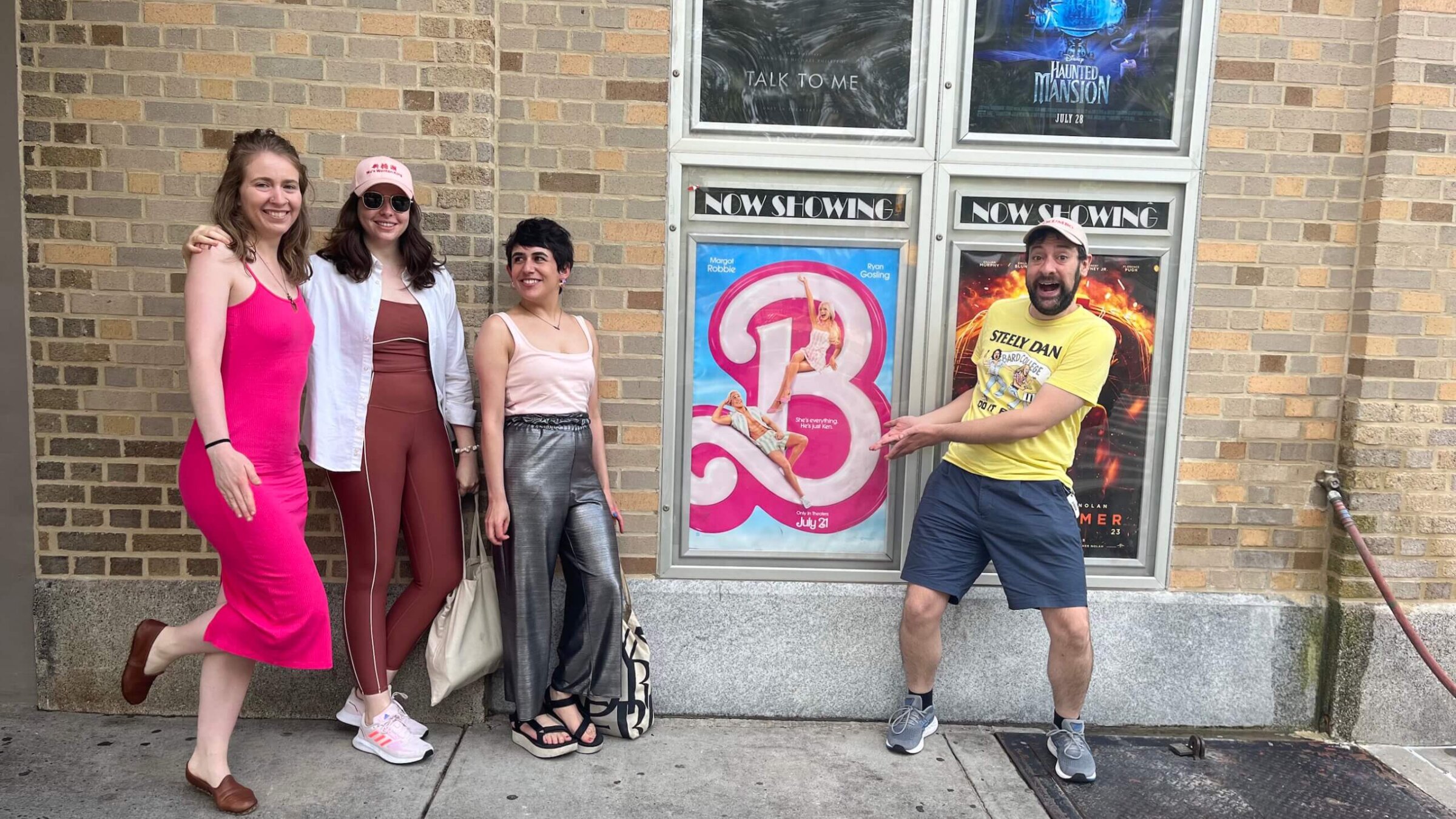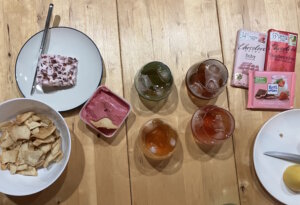Is ‘Barbie’ Jewish? Is ‘Barbie’ Shabbat? Is ‘Barbie’ the Book of Genesis? Four drunk Jews discuss
‘Does Barbie have a concept of religion or Jewishness? Depends who plays with her’

These Barbies all work at the Forward! Photo by Chris Norris-LeBlanc
As promotional materials have declared for months on end: Barbie is everything.
And as the much-hyped new movie Barbie makes clear, one of the things Barbie might be is, well, kind of Jewish.
Four of the Forward‘s culture writers, intrigued by suggestions that the biggest, pinkest movie of the summer might be interestingly Hebraic, went to see it the day it opened in New York. (OK, yes, we were sold by director Greta Gerwig telling The New York Times that one of her major inspirations for the film was her experience of attending Shabbat dinners at a friend’s house growing up: “‘You are a child of God,'” she remembers being told at those dinners, “‘I put my hand over you, and I bless you as a child of God at this table.'”)

Afterwards, over a staggering array of pink snacks (who knew you could buy decent pink cheese?) and cocktails made with sparkling rosé, we sat down to talk about how much of Barbie‘s promise — Jewish and otherwise — was fulfilled.
We loved Rhea Perlman as Barbie’s Jewish inventor, Ruth Handler, “a 5-foot-nothing grandma with a double mastectomy and tax evasion issues.” And we cackled at the film’s most obvious Jewish line, which comes courtesy of Will Ferrell’s bumbling Mattel CEO, who pleads his liberal credentials by saying “some of my closest friends are Jewish.”
Amazing: Same! Here, four Jewish friends weigh in. Our participants: Mira Fox, culture writer and expert on all things internet culture; PJ Grisar, culture writer and Oppenheimer aficionado; Irene Katz Connelly, books editor and major fan of American Girl dolls; Talya Zax, innovation editor and champion sourcer of pink foods.
The following conversation has been edited for length and clarity.
Talya: Let’s start by talking about which Barbies we feel most connected to after that movie.
Mira: They opened with a pretty strong journalist Barbie shout out.
Talya: I wanted to know what she was investigating.
PJ: Are there scandals to report on in Barbieland?
Irene: No, they all love each other. But I don’t identify with any of the Barbies. I fully enjoyed the whole movie, but I don’t think I felt like, yeah, this gets at the heart of my experience as a woman.
PJ: What is everybody’s relationship to Barbie? Did you have Barbies growing up?
Talya: I had Barbies. But I can’t remember making up stories about them, and I had other dolls I did make up stories about. Barbie was there to be like, gazed upon.
Irene: My mom didn’t really want me to have Barbies. And I think I was too obedient to her second-wave feminist critique to challenge that. I do remember enjoying it when relatives gave me Barbies. But I think that Barbies are actually very non-narrative dolls.
Mira: I was not a big doll child. But my grandmother gave me some Barbies, and I played with them very narratively – but not Barbie narratives. They were integrated fully with all of my other toys. So there would be an odd Barbie at war with my army of, like, plastic horses. There’s a schtick in the movie about Barbies who get played with too hard; I definitely played with my Barbies too hard.
PJ: The only Barbies that I owned were from McDonald’s — Happy Meal toys. And I actually only got one because it came with a horse and I (like Ken) was obsessed with horses.
‘Girlboss feminism’
Talya: If we hadn’t had the Trump years, do we feel like we would have the same Barbie movie or a different Barbie movie?
Irene: This is more of a pre-Trump movie than a post-Trump movie — very “a female president will save us! Our Supreme Court is functional!” In some ways it feels like it is seeking comfort in the girlboss feminism and social conventions of pre-Trump liberals.
Mira: It doesn’t feel really related to Trumpian politics so much as the way that the internet flourished during the pandemic. Like Ken’s evolution through very recognizable memes of internet archetype man — male model influencer; tech bro playboy; guru era where he’s like, “I learned tie dye and I have a mantra about how I’m enough.”
Talya: Rhea Perlman. What do we think about her playing such a large role in this?
PJ: Always like to see Rhea Perlman.
Irene: I thought it was schlocky, sorry. Ruth Handler was a savvy woman who was probably a little unscrupulous. But in the movie she’s just like, “I’m a Jewish grandmother who had a double mastectomy. And so it’s like, fine that I made Barbie because I’m a frail human.”
‘Jewish ideas of femininity’
Mira: Ruth Handler being Jewish and creating Barbie — even outside of this movie — to what extent do Jewish ideas of femininity influence the toy or the movie’s ideas of femininity?
Talya: There’s a part of me that wonders how much of this is internalized self-hatred, where it’s like, we’re gonna build a tall blonde woman who has the most exaggerated waist of all time. But then I’m like, is it internalized self hatred to read that as internalized self hatred?
I do think you could read a lot of different things into the ways in which Barbie, as a brainchild of a Jewish woman, reflects on ideas of Jewish women. Barbie is definitely in some ways coded Aryan, and I feel like that was why I laughed when some teen girls call Barbie a fascist in the movie — it’s hilarious, because we know a lot of fascists have looked at Barbie and been like, “yeah, that is what we are going for.”
This film wanted to be really subversive and fun. How successful do we feel it is at being an independent piece of art that people can enjoy, regardless of their degree of investment in Barbie?
Irene: I feel like I have no personal investment in Barbie, but I thoroughly enjoyed the film.
PJ: There were more Jews than I was expecting.
Mira: Every individual joke was great and kind of subversive, but they did not hang together at all. There was just like, a good little dig at like, men’s rights red pill subreddits, and a good little dig at corporate culture. It’s this strange dissonance of every individual moment being really smart and funny, and its overarching message not really being much. If anything, it was just further entrenching gender roles and the supremacy of corporations.
‘Live the life you want’
PJ: Did it feel like Shabbat?
Irene: There’s no way a movie about a Barbie achieving self-actualization is going to have the same effect as being like, the recipient of an ancient blessing by close family.
Mira: It did not feel Shabbat-y to me. I was just sitting there trying to figure out, if there was a blessing, then what exactly was the blessing supposed to be?
Talya: I think it was basically supposed to be like: Live the life you want. But that also feels very reductive. How do each of you feel leaving this movie? Affirmed? Vaguely upset about capitalism?
PJ: I had a good time. It’s not something I’m gonna think very deeply about, though.
Talya: I do wonder how the politics are going to be received. Making art in contemporary America, there’s no way to stop yourself from thinking about how it’s going to play politically across the spectrum. This did feel like a movie that was made for liberal America, but also like a movie that was trying to have enough for conservative America that it could pass. I wonder if part of what we’re identifying as the wishy-washy character of it, in terms of its ability to make a point, has to do with trying to market itself broadly.
Mira: Which is just Mattel’s need to market itself broadly. Mattel doesn’t really want to be a feminist icon. It just doesn’t want to be an anti-feminist icon.
PJ: How risky is it, really, to let Greta Gerwig just sort of have her way with it?
Mira: I think the movie will sell toys. To people who had just, like, forgotten about Barbie, it’s going to remind them. And for people who wanted to buy their kids Barbie, but maybe felt a little guilty about it, they’ll be like, no, there’s this whole other feminist narrative that goes with it. Even though its feminism is pretty basic.
Talya: The whole thing about “there is no ethical consumption under capitalism” — I wonder if there’s a parallel about there being no truly interesting artistic creation under intellectual property. This tried really hard to be interesting, but it was still clear the entire time that what it was doing was selling intellectual property.
‘A conversion story’
PJ: In this movie, Barbie’s creator (and possibly mother?) is Jewish . Is Barbie Jewish?
Mira: She is, because — spoilers! — she eventually takes on the last name Handler. She was stamping her descent there.
Talya: Is this movie a conversion story?
PJ: Does Barbie have a concept of religion or Jewishness? Depends who plays with her.
Talya: My big read of this movie is that Barbie is both Adam and Eve and has to leave the Garden of Eden, which is Barbieland.
Mira: Totally. She even literally says she has become self-conscious when she enters the real world.
Talya: Would any of us, if we lived in Barbieland and had the option to become a human, choose to stay in Barbieland?
Irene: It seems kind of horrible. You live the same day over and over again?
PJ: Speaking of Adam and Eve, it sort of inverts that. If we take the read that Eve, you know, comes from Adam, from his rib, Ken comes from Barbie.
Talya: In this way it is like Shabbat dinner: We’ve ended up arguing over a relatively broad religious story in ways that are entertaining to all of us, I hope. Mira, are you trying to eat a lemon right now? Is this something you do frequently?
Mira: Yeah.



























